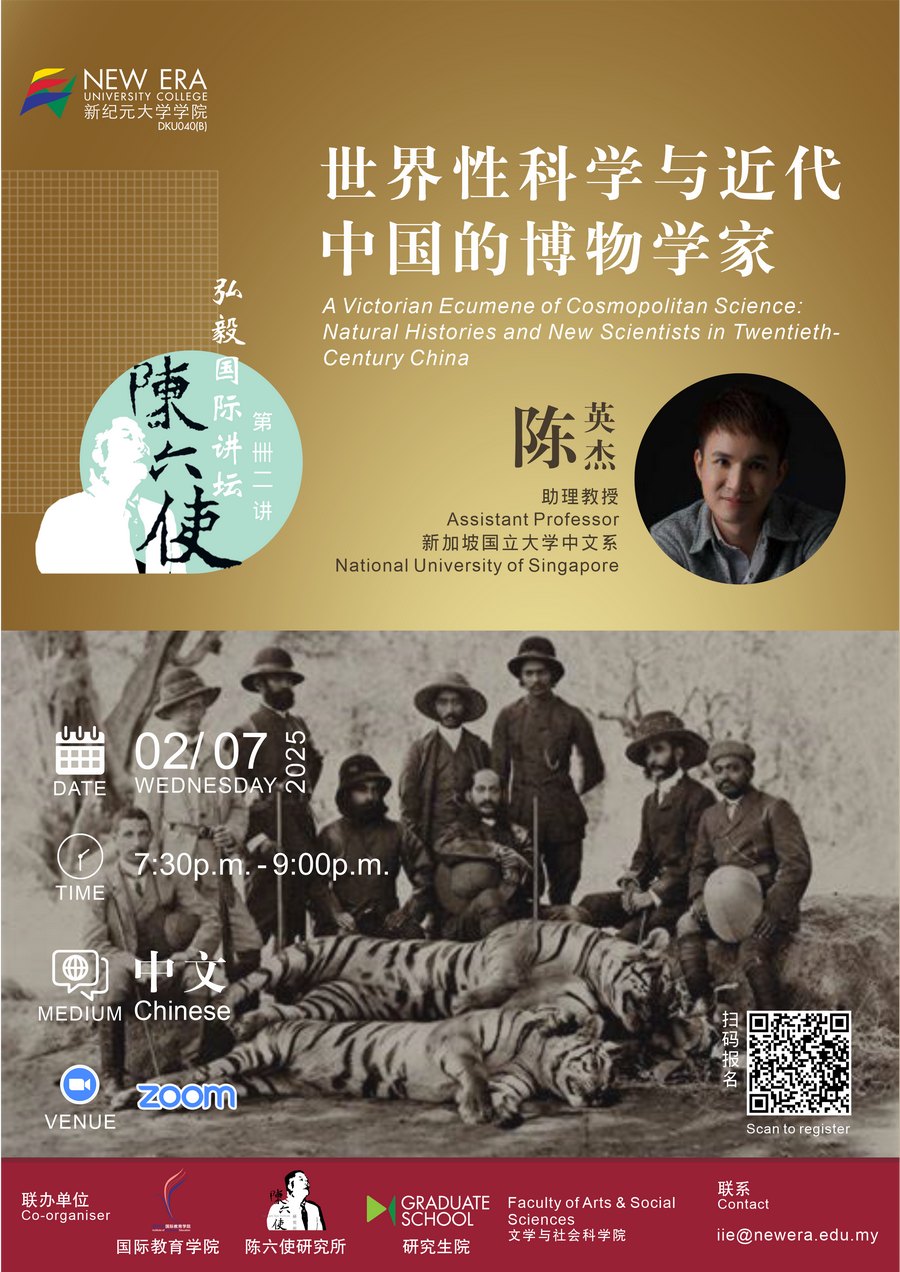【42nd Talk】Dr. Ying-kit Chan: “A Victorian Ecumene of Cosmopolitan Science: Natural Histories and New Scientists in Twentieth-Century China”
Upcoming Event

| Introduction | The 42nd session of the “Tan Lark Sye Lecture Series,” organized by the Institute of International Education and the Tan Lark Sye Institute at New Era University College is now open for registration. The lecture will be delivered by Dr. Ying-kit Chan of the National University of Singapore. The topic of this article focuses on natural histories and new scientists in twentieth-century China. Much has been said about the dialectical relationship between empire and science and how individual scholarly disciplines, such as natural history, emerged to affirm the values and meanings of imperial expansion for both metropoles and colonies. Less has been said about how science worked for a nascent coterie of intellectuals in late Qing and early Republican China who received their scientific education in European and North American institutions and entered an increasingly transnational network of both white and nonwhite professional peers within the Victorian ecumene. By focusing on the discipline of natural history, which distinguished humans from nature and subjected the latter to scientific analysis and classification, this paper identifies three key purposes of natural history for cosmopolitan intellectual elites in twentieth-century China: the pursuit of class status, the transformation of local heritage and endemic species into a national essence, and the generation of popular appeal by shifting from text-based to object-based epistemologies. |
| Speaker | Dr. Ying-kit Chan (Assistant Professor, Department of Chinese Studies, National University of Singapore) Dr. Ying-kit Chan, PhD from Princeton University, the Assistant Professor of Chinese Studies at the National University of Singapore. Dr. Chan was formerly a research fellow at the International Institute for Asian Studies, Leiden University. Currently, he serves as the deputy chief editor of the International Journal of China Studies and the book review editor of the Asian Review of World Histories. He also sits on the editorial boards of Ming Qing Studies, Malaysian Journal of Chinese Studies, Southeast Asia: A Multidisciplinary Journal, Thai Journal of East Asian Studies, and the Scopus-indexed book series Asia in Transition (Springer). His research focuses on cultural studies, and the history of science in late Qing and early Republican China, and also broadly interested in the Chinese Overseas, Southeast Asian studies, and Chinese. His recent edited books include: Transnational Southeast Asia: Communities, Contestations, and Cultures (2025), The Cityscapes of Taipei, Hong Kong, and Singapore during the Cold War (2025), New Directions in Thai Studies (2025), Southeast Asia in China: Historical Entanglements and Contemporary Engagements (2023), Contesting Chineseness: Ethnicity, Identity, and Nation in China and Southeast Asia (2021) etc. |
| Moderator | Dr. Lew Siew Boon (Assistant Professor at the International Education College of New Era University College) Dr. Lew received her PhD from the National University of Singapore and is currently an Assistant Professor at the Institute of International Education, New Era University College, as well as the Head of the International Academic Exchange Office. Her main research interests include folklore and folk culture, and the history of Chinese communities in Singapore and Malaysia. She has published several works, including Discovering the Goddess of Mercy in Swee Nyet Temple of Pulai, Kelantan and Hakka in China and Southeast Asia: Cross-Regional Field Work and Essays (co-authored). She has also published more than 20 academic papers. |
| Information |
Registration is free. Please complete your registration by Tuesday, 1 July 2025. |
Trailer (Video)
Lecture Postscript
The 42nd Tan Lark Sye Lecture Series organized by the Institute of International Education, New Era University College (NEUC) was held on 2nd July 2025. The event featured Dr. Ying-kit Chan, an Asst. Prof. from National University of Singapore (NUS), His lecture titled “A Victorian Ecumene of Cosmopolitan Science: Natural Histories and New Scientists in Twentieh-Century China,” provided an in-depth exploration of the Natural Histories and New Scientists in Twentieh-Century China.
The keynote speaker, Dr. Ying-kit Chan, PhD from Princeton University, is Asst. Prof. of Chinese Studies at the National University of Singapore. Dr. Ying-kit Chan was formerly a research fellow at the International Institute for Asian Studies, Leiden University. Currently, he serves as the deputy chief editor of the International Journal of China Studies and the book review editor of the Asian Review of World Histories. He also sits on the editorial boards of Ming Qing Studies, Malaysian Journal of Chinese Studies, Southeast Asia: A Multidisciplinary Journal, Thai Journal of East Asian Studies, and the Scopus-indexed book series Asia in Transition (Springer). His research focuses on cultural studies, and the history of science in late Qing and early Republican China, and also broadly interested in the Chinese Overseas, Southeast Asian studies, and the Chineseness. His recent edited books include: Transnational Southeast Asia: Communities, Contestations, and Cultures (2025), The Cityscapes of Taipei, Hong Kong, and Singapore during the Cold War (2025), New Directions in Thai Studies (2025), Southeast Asia in China: Historical Entanglements and Contemporary Engagements (2023), Contesting Chineseness: Ethnicity, Identity, and Nation in China and Southeast Asia (2021) etc.
In this lecture, Dr. Ying-kit Chan explored how modern Chinese intellectuals participated in the development of natural history within a global scientific context. He pointed out that while natural history is often seen as part of imperial science, Chinese scholars in the late Qing and early Republican periods were not passive recipients but active contributors to transnational knowledge networks. Through their engagement with natural history, they sought scientific recognition, redefined local resources as national assets, and helped shift traditional text-based knowledge toward object-centered scientific inquiry. The lecture highlighted this process as a key stage in China’s intellectual transformation and engagement with global science.
Following the lecture, the audience, and the moderator engaged actively with the speaker during the Q&A, raising questions related to the natural histories. Dr. Ying-kit Chan provided insightful responses and in-depth answers. The lecture was hosted by Asst. Prof. Dr. Lew Siew Boon (Head, International Academic Exchange Office NEUC) attracted an audience of over 100 participants.




